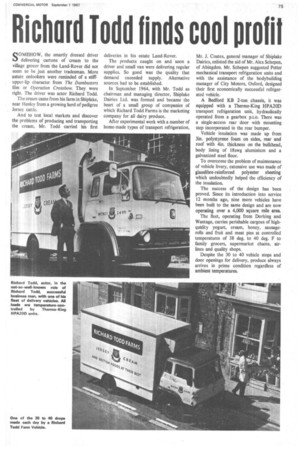Richard Todd finds cool profit
Page 77

If you've noticed an error in this article please click here to report it so we can fix it.
OMEHOW, the smartly dressed driver delivering cartons of cream to the village grocer from the Land-Rover did not seem to be just another tradesman. More astute onlookers were reminded of a stiffupper-lip character from The Dambusters film or Operation Crossbow. They were right. The driver was actor Richard Todd. The cream came from his farm in Shiplake, near Henley from a growing herd of pedigree Jersey cattle.
And to test local markets and discover the problems of producing and transporting the cream, Mr. Todd carried his first deliveries in his estate Land-Rover.
The products caught on and soon a driver and small van were delivering regular supplies. So good was the quality that demand exceeded supply. Alternative sources had to be established.
In September 1964, with Mr. Todd as chairman and managing director, Shiplake Dairies Ltd. was formed and became the heart of a small group of companies of which Richard Todd Farms is the marketing company for all dairy produce.
After experimental work with a number of home-made types of transport refrigeration, Mr. J. Coates, general manager of Shiplake Dairies, enlisted the aid of Mr. Alex Schepen, of Abingdon. Mr. Schepen suggested Petter mechanical transport refrigeration units and with the assistance of the bodybuilding manager of City Motors, Oxford, designed their first economically successful refrigerated vehicle.
A Bedford KB 2-ton chassis, it was equipped with a Thermo-King HPA2OD transport refrigeration unit, hydraulically operated from a gearbox p.t.o. There was a single-access rear door with mounting step incorporated in the rear bumper.
Vehicle insulation was made up from 3M. polystyrene foam on sides, rear and roof with 4in. thickness on the bulkhead, body lining of 18swg aluminium and a galvanized steel floor.
To overcome the problem of maintenance of vehicle livery, extensive use was made of glassfibre-reinforced polyester sheeting which undoubtedly helped the efficiency of the insulation.
The success of the design has been proved. Since its introduction into service 12 months ago, nine more vehicles have been built to the same design and are now operating over a 4,000 square mile area.
The fleet, operating from Dorking and Wantage, carries perishable cargoes of highquality yogurt, cream, honey, sausagerolls and fruit and meat pies at controlled temperatures of 38 deg. to 40 deg. F to family grocers, supermarket chains, airlines and quality shops.
Despite the 30 to 40 vehicle stops and door openings for delivery, produce always arrives in prime condition regardless of ambient temperatures.












































































































































